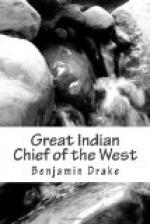In the winter of 1822, Black Hawk and his party, encamped on the Two-rivers, for the purpose of hunting, and while there was so badly treated by some white men, that his prejudices against the Americans were greatly strengthened. He was accused of having killed the hogs of some settlers, who, meeting him one day in the woods, wrested his gun from his hands, and discharging it in the air, beat him so severely with sticks that for several nights he was unable to sleep. They then returned him his gun and ordered him to leave the neighborhood. Of the perpetration of this outrage, there is little doubt, while the fact of Black Hawk’s having committed the offence charged upon him, rests, at best, upon suspicion. Supposing him to have been guilty, and the supposition is at variance with the whole tenor of his intercourse with the whites, it was on their part, one of those brutal appeals to club law, which are but too often practised towards the Indians; and which, when avenged by them, not unfrequently brings upon their nation, the power and the arms of the United States.
The ensuing summer, the expediency of a removal of the whole of the Sacs and Foxes, to the west side of the Mississippi, was urged upon them by the agent at Fort Armstrong. The principal Fox chief, as well as Keokuk, assented to the removal. The latter sent a messenger through the village informing the Indians that it was the wish of their great Father, the President, that they should remove, and he pointed out the Ioway river as presenting a fine situation for their new village. There was a party, however, among the Sacs, made up principally of the “British Band,” who were decidedly opposed to a removal; and they called upon their old leader, Black Hawk, for his opinion on the question. He took the ground that the land on which their village stood had never been sold; that the Americans had, therefore, no right to insist upon the measure, and that as a matter of policy he was opposed to it. The old man was probably swayed in his decision by another cause. He felt that his power in the tribe was waning before the rising popularity of Keokuk. Here was a question on which their people differed in opinion. By placing himself at the head of one of the parties, he might recover his influence, or at least sustain himself against the overshadowing ascendancy of his rival. He had an interview with Keokuk to see if the matter could not be adjusted with the President, by giving him other lands in exchange for those on which their village stood; and the latter promised to see the great chief at St. Louis, on the subject. During the following winter, while Black Hawk and his party were absent on a hunting expedition, several white families arrived at their village, destroyed some of their lodges and commenced making fences over their corn-fields. Black Hawk upon hearing of this movement, promptly returned to Rock river, and found his own lodge occupied by the whites. He




